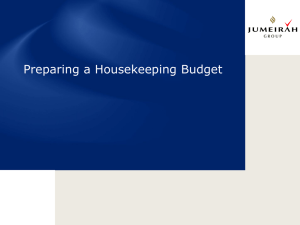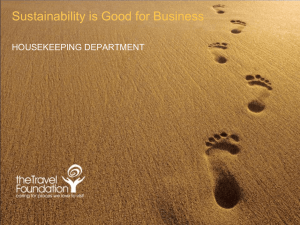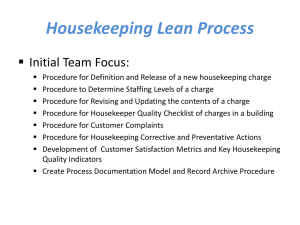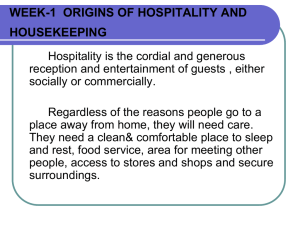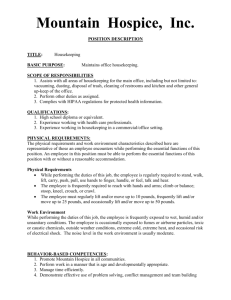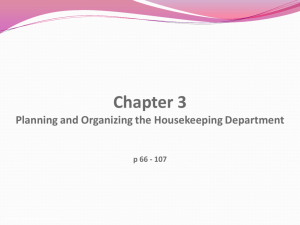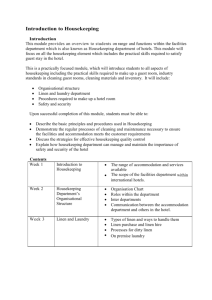Programme: BSc (Hons) - The Emirates Academy of Hospitality
advertisement
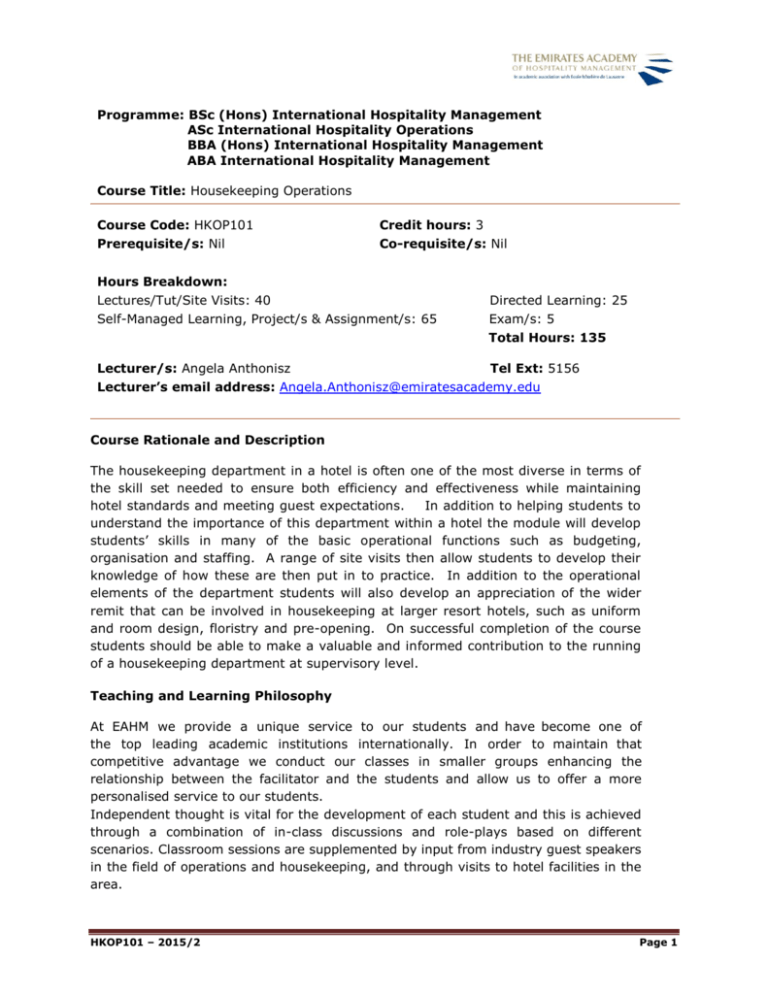
Programme: BSc (Hons) International Hospitality Management ASc International Hospitality Operations BBA (Hons) International Hospitality Management ABA International Hospitality Management Course Title: Housekeeping Operations Course Code: HKOP101 Credit hours: 3 Prerequisite/s: Nil Co-requisite/s: Nil Hours Breakdown: Lectures/Tut/Site Visits: 40 Directed Learning: 25 Self-Managed Learning, Project/s & Assignment/s: 65 Exam/s: 5 Total Hours: 135 Lecturer/s: Angela Anthonisz Tel Ext: 5156 Lecturer’s email address: Angela.Anthonisz@emiratesacademy.edu Course Rationale and Description The housekeeping department in a hotel is often one of the most diverse in terms of the skill set needed to ensure both efficiency and effectiveness while maintaining hotel standards and meeting guest expectations. In addition to helping students to understand the importance of this department within a hotel the module will develop students’ skills in many of the basic operational functions such as budgeting, organisation and staffing. A range of site visits then allow students to develop their knowledge of how these are then put in to practice. In addition to the operational elements of the department students will also develop an appreciation of the wider remit that can be involved in housekeeping at larger resort hotels, such as uniform and room design, floristry and pre-opening. On successful completion of the course students should be able to make a valuable and informed contribution to the running of a housekeeping department at supervisory level. Teaching and Learning Philosophy At EAHM we provide a unique service to our students and have become one of the top leading academic institutions internationally. In order to maintain that competitive advantage we conduct our classes in smaller groups enhancing the relationship between the facilitator and the students and allow us to offer a more personalised service to our students. Independent thought is vital for the development of each student and this is achieved through a combination of in-class discussions and role-plays based on different scenarios. Classroom sessions are supplemented by input from industry guest speakers in the field of operations and housekeeping, and through visits to hotel facilities in the area. HKOP101 – 2015/2 Page 1 For the students to achieve the objectives of this module, the facilitator acts as a guide and as an organizer. The facilitator has the responsibility to deliver and monitor practical sessions; to deliver the theoretical background of the module based on different concepts, and to act as an advisor so th at students feel comfortable. Contact with students should be in a professional manner without forgetting the element of fun and enjoyment. The facilitator incorporates the above skills and attitude for the completion of a higher standard of education for the students. Intellectual development is an expected result that will assist the students to develop further in the area of the Rooms Division, allowing them to take what they have learnt and put it into practice later in life. As a facilitator, constant research and reading updates in the field are essential to highlight current practices within the industry. The operational aspects within the field are also highlighted and explained to students throughout the module. This is achieved through utilising real life examples and situations. As a result case studies, examples, scenarios, presentations and exercises are used to facilitate the students learning process and the achievement of the goals and completion of this module learning outcomes. Contribution to Graduate Profile 1. Competently contribute to hotel operations in the operational departments of: food preparation and service, and Housekeeping and Front Office. 2. Function as a well-rounded business professional, ready and willing for the world of work with high levels of social competence and ethical and cultural awareness. 3. Appreciate and be committed to on-going personally professional development, and the development of those subordinates to them. Specific Learning Outcomes Knowledge: Upon completion of this course, students will know how to: LO1. LO2. LO3. Explain the management styles used in the housekeeping department and to explain the purpose, role and areas of responsibility of a housekeeping department in a hotel unit. Explain the organization structure within the housekeeping department and to list the responsibilities of an executive housekeeper, supervisor and rest of housekeeping employees. Highlight job specifications of the various positions within the department, highlighting the importance and need of team working amongst employees and management. Managing housekeeping personnel and all explain the human resources practices needed. Understand the importance and role of planning housekeeping operations with the use of documents and SOPs by demonstrating an understanding of the activities HKOP101 – 2015/2 Page 1 LO4. LO5. LO6. LO7. LO8. involved alongside with operational procedures. Identify the skills needed to effectively manage the departmental budget, inventory, material classification and any related pre-opening operations. Explain the importance of cleanliness and hygiene and identify the guestroom layouts, status codes and the standard contents of a guestroom. Understand the process of cleaning the different types of guest rooms and public areas. Consider the wider remit of the executive housekeeper in relation to aspects such as room design, uniform design and preopening of a hotel. Understand the crucial meaning of safety and security, list possible hazards for housekeeping employees and identify ways of preventing pests into the hotels by the use of pest control and proper waste disposal. Skill Upon completion of this course, students will be able to demonstrate: LO9. A clear understanding of the implications for effectively planning and managing a housekeeping department. LO10. An appreciation of the wider remit of the executive housekeeper in relation to the running of the housekeeping department Autonomy and Responsibility Competence Upon completion of this course, students will be able to state the following reporting, regulating or ethical considerations: LO 11. LO 12. Appreciate the roles and responsibilities of the housekeeping department in a hotel unit. Understand the importance and role of planning housekeeping operations with the use of documents and SOPs by demonstrating an understanding of the activities involved alongside with operational procedures. Self-Development Competence Upon completion of this course, students will be able to demonstrate the need to continually research and up skill the following areas: LO 13. LO 14. Effective planning and management within hotel departments. The importance of training and monitoring staff performance in aspects such as cleaning, health and safety and inventory management. HKOP101 – 2015/2 Page 1 Role in Context Competence Upon completion of this course, students will be able to effectively contribute to the following activities or endeavours: LO 15. LO 16. Supervision of employees and their activities within the housekeeping department. Contribute to the development of paperwork and SOP’s that support the effective management of the housekeeping department. Transferable and Employment Skills SKILLS PRACTICED TAUGHT ASSESSED 1. Written Communication 2. Verbal Communication 3. Commercial Awareness 4. Problem Solving 5. Networking 6. Planning and Organising 7. Numeracy 8. Computer Literacy 9. Time Management 10. Research 11. Team Work 12. Leadership 13. Negotiating 14. Customer Service HKOP101 – 2015/2 Page 1 Weekly Content DAY 1. 2. 3. 4. 5. HRS 4 4 1+ 3 TOPIC/S CONTENT Introduction to Housekeeping Operations Overview of the module, key topics, course assessment, deadlines, site visits and learning expectations. An introduction to the role of housekeeping in relation to running a hotel and other facilities that require housekeeping. The role of the Executive Housekeeper Guest Lecture – Hege Aamo is the Resort Executive Housekeeper for Jumeirah and will provide students with an overview of careers in housekeeping, the responsibilities of the executive housekeeper and the organisational hierarchy of the hotel. Site Visit – Laundry Operations (1 hour) Lecture (3 hours) The planning process in the housekeeping department 4 Burj al Arab Site Visit 4 Issues of Aesthetics, Design and Ergonomics in Housekeeping The Site visit to Jumeirah Laundry will provide students with an insight into the operations associated with running and managing an in-house laundry. The new facilities at Jumeirah also introduce the students to the need for ‘Green Approaches’ and cost savings associated with upgrading facilities. READING/S There is no required reading this week but students are directed to the library to identify where the housekeeping resources are located. Video – Housekeeping in the Cruise Ship Industry Reading 1 – For Discussion in Class – ‘Housekeeping the Heart of Hotels’ Hospitality Magasine . On Moodle Reading 2 – Chapter 1 – Casado M (2012) Housekeeping Management Reading 1 – Article ‘Cleaning Up, Trends in Houskeeping’ Reading 2 – ‘Green hotels, opportunities for success’ The lecture will discuss the planning processes involved in managing the housekeeping department Reading 1 – Chapter 5 – Raghubalan & Raghubalan (2009) Hotel Housekeeping Operations and Management Students will visit the housekeeping operations of the Burj al Arab hotel. The tour will cover all aspect of housekeeping management in the hotel and will include a tour of the rooms and observations of the staff training. Reading 1 – Handout from Burj al Arab Guest Speaker – Hege Aamo Discusses her role in room and uniform design at Jumeirah hotels and considers the importance of aesthetics and creating the Reading 1 – Making Sense of the Hotel Guest Room Reading 2 - Assessing the Value of good design in hotels HKOP101 – 2015/2 ASSESSMENT LO None LO1 LO11 None LO2 None LO6 LO8 Quiz 1 LO3 LO8 LO14 Quiz 2 Page 1 LO10 WOW factor for the consumer 6. 7. 8. 9. 10. 11. 4 4 4 4 Students will be introduced the issues of effectively managing personnel within the housekeeping department and be introduced to the techniques involved in recruitment and selection and performance monitoring Reading 1 – Chapter 3 - Raghubalan & Raghubalan (2009) Hotel Housekeeping Operations and Management Students should review all content to date and be prepared for the progress test The progress test will last 1 and a half hours and will consider all areas discussed in class and on site visits Daily Routines and Operations in Houskeeping Students will consider the daily routine attached to running and manging the housekeeping department and will consider the range of room status issues that may affect the smooth running of the day. Students will also consider the issues of inventory control of room amenities. Reading 1 – Chapter 10 – Jones (2008) Professional Management of Housekeeping Operations LO5 LO12 LO16 Opening and PreOpening a Hotel Guest Lecturer Hege Aamo discusses the implications for the opening and preopning of a hotel in a range of international contexts. Challenges including procurement, staffing, creating SOP’s inventory control and maintaining standards. Students should use this time to prepare for their group presentations Quiz 3 LO3 LO4 LO9 LO12 Students wil be expected to demonstrate a clear understanding of room design, the implications for housekeeping, the use of ergonomics in terms of layout and health and safety and an understanding of aesthetics in relation to demand from the consumer Students should have conducted indepedent research in support of their presentation Group Presentations Students will consider the importance of inventory control and budgeting in relation to managing the housekeeping function. Students will be provided with a range of activities and exercises to work on in class and to practice in advance of the final exam. All mini cases and answers will be posted on moodle People Management in Housekeeping Review 4 4 Hotel Inventory Control and Budgeting HKOP101 – 2015/2 LO2 LO14 Progress Test Quiz 4 Page 1 All LO’s to date LO6 LO10 LO3 LO4 Discussions of par, cross charging expenses, the different types of budget and the need for inspection and monitoring will be combined with in class mini cases that allow students to practice relevant calculations on stock ordering, wages and linen control. 12. 4 Revision Students will review all content covered since the progress test in week 7 Final Exam Teaching and Learning Strategies The course is delivered through a combination of lectures, in-class discussions, visits and guest lectures and students are expected to be on time and appropriately attired on every occasion. Please note that the following guidelines will be maintained during the course: You should take notes during site visits and during guest lectures as there may be questions in the final exam on the information you receive. Students will be marked absent from the class if they are late arriving. Students should be appropriately attired at all times and will be marked absent if standards are not adhered to. Students who are absent from class must take responsibility for catching up with all work missed. Late submission of work will be penalised in accordance with academic policies. Format, Policies and Procedures The course will be delivered using a combination of lectures, in class discussions, guest lectures and site visits enabling students to develop an appreciation of the operational aspects of managing a housekeeping department and place these within the context of a real work environment. Students are responsible for the completion of all reading assignments prior to class. Prior preparation is important for meaningful classroom discussions. Students are expected to assist in maintaining a classroom environment which is conducive to learning. In order to assure that all students have an opportunity to gain from the time spent in class, students will be prohibited from using cell phones and beepers, making offensive remarks, sleeping, reading newspapers (online) or any non-class related materials, online instant messaging, or engaging in any other form of distraction. Inappropriate behaviour in the classroom will result in, at least, a request to leave class. HKOP101 – 2015/2 Page 1 All LO since midterm Students are expected to arrive on time for class and remain for the entire class period. Habitual lateness and/or leaving the classes early (for whatever reasons), are evidence of very low commitment. Any student who, because of appropriate extenuating circumstances, may require some special arrangements in order to effectively meet course requirements should contact the instructor at the beginning of the semester to make necessary accommodations. Attendance Attendance for this course is compulsory. If a student accumulates 3 unexcused absences he/she will be automatically withdrawn/ failed from this course. Attendance will be recorded at the beginning of each hour, in accordance with Academy policy. It is particularly important that all students attend site visits and maintain a professional attitude during the entire duration of the visit. Assessments, Weighting and Deadlines Your grade in the course will be based on both your individual and group efforts and performance. Participation (10%) Students will be awarded an overall grade for the trimester which is linked to attendance in class and on-site visits, professionalism during site visits and guest lectures and completion of pre-set class work and activities. Each absence from class will incur a 5% deduction from the final grade. Unprofessional behaviour during a site visit or guest lecture will incur a 10% deduction from the final grade. Failing to complete class work and activities as directed by the tutor will incur a 5 % deduction from the final grade. Coursework (50%) Quizzes (10% in total) Group Project (20%) Progress test (20%) Final Exam (50%) Grading Rubrics Group Project (20%) – Assessment Outline HKOP101 – 2015/2 Page 1 Group Size – 4/5 students Recent trends in the hotel industry have seen a growth in hotels developing smaller rooms for guests that provide all of the amenities a guest requires but in a smaller space and at a cheaper price. In order to compete and maximize revenue hoteliers have adopted a range of approaches to make smaller rooms more appealing. With this in mind you are to design and develop a hotel room concept. This should be thought through in terms of star rating, theme, location etc. Your hotel room concept can be located anywhere in the world and should consider the competition in the destination and how you can differentiate yourself as a unique offer to the consumer. Your concept should consider the following aspects: Room Design – Use of space, ergonomics, layout, use of furniture, room dimensions, guestroom supplies etc. Room Concept – Use of colour, lighting, textiles, soft furnishings, floor coverings, finishings, window treatments, flower arrangements etc. Target Market – How does your room design reflect the target market you are trying to attract; have you had to add any specific touches to attract your target market; what price do you anticipate charging for the room you have designed? Does your room design give you a particular selling point that the competition does not have? Target markets can be more general such as business or leisure travellers or they can be specific to a niche market and tailored to specific interests. Implications for Housekeeping – Does your design present any special challenges or advantages for the housekeeping department in terms of cleaning? You should think about the issue of manoeuvrability in a small space and look at some of the new innovations in terms of storage, technology, etc. Room Format – your room format can be designed in any way you like but must not exceed 350 square feet (32.5 square meters). This includes the bathroom space. Financial Breakdown – There is no budget limitation for your hotel concept but you should provide costs for the main items in terms of fixtures and furnishings. Based on your refurbishment cost and the room prices of the competition you should be able to provide an outline price for your room. Your overall concept should be as complete as possible and this can only be achieved through research on trends in hotel design and looking at areas such as tourist numbers and consumer preferences. Your room design should be presented via a power point presentation or through prezi and through the development of a ‘mood board’ or design portfolio which shows sketches and images to support your design. You should present your room design via a 15-minute group presentation. should actively participate in the presentation. All students Your presentation should be supported with an appropriate reference list which should be HKOP101 – 2015/2 Page 1 attached to the back of a copy of your power point slides and handed to your tutor prior to your presentation. Your reference list should demonstrate a range of research and should NOT be made up of a list of website information. Example Room Format Assessment Milestones Week 3 – Student Groups to be confirmed with your tutor. Week 5 – Group Designs to be confirmed with your tutor. You should be able to provide an outline of your concept at this stage. This should include location, proposed theme, star rating, target market and any other information you consider to be important in explaining your ideas. Week 7 – Having reviewed your idea you should provide the tutor with a 2 sided A4 summary and a reference list with at least 6 references. This should be given to me at the start of the lecture in week 7. Week 10 – Presentation Deadline. These will be scheduled in the tutorial sessions this week. Please come to class with a copy of your slides, a complete reference list and your peer evaluations. HKOP101 – 2015/2 Page 1 Grading Criteria Element Introduction Maximum Marks 5 Room Design 10 Room Concept 15 Target Market 15 Implications for housekeeping Room Format 10 Audio Visual Materials 10 Mood Board / Design Portfolio 10 Innovation and Creativity Conclusions 5 Research and Referencing Total Marks 5 5 10 Criteria Group Members Introduced. Presentation Objectives Identified. Overview of what the presentation includes. Use of space, ergonomics, layout, use of furniture, room dimensions, guestroom supplies etc. Use of colour, lighting, textiles, soft furnishings, floor coverings, finishings, window treatments, flower arrangements etc. Clear awareness of target market. Pricing strategy, USP and level of Competition for the selected market. You should be able to identify any issues that may affect the process involved in cleaning and servicing the room. The room layout with rooming dimensions clearly identified. These should not exceed the allocated room space. Good use of prezi or PowerPoint with key information on slides, minimal errors and clear progression Your mood board or portfolio should be effectively utilized with clear information, good use of images and other materials to create a 3D aspect to the concept The room concept demonstrates original thought and use of creative ideas to overcome space issues. Effective Summing Up of the Presentation and Clear Justification for the choice of room. Clear evidence of research in support of your presentation. This should demonstrate wider reading and should contain a minimum of 12 references. 100 Methods for Monitoring and Authenticating Student Work Unless stated otherwise, students are required to read assigned chapters and case studies prior to class and be prepared to participate. If you find yourself having any difficulty with any aspect of this course, please discuss the problem with the instructor immediately. Most difficulties can be easily solved through discussion. This approach will assist the instructor in responding to your needs and improving the course. Academic Integrity Each student in this course is expected to abide by EAHM’s Code of Academic Integrity. Plagiarism, in any form is not permitted, and correct referencing policy should be followed at all times (Harvard). HKOP101 – 2015/2 Page 1 Learning Resources Required Readings/s There is no set text for the course. Students will be required to read all materials, cases, lecture slides, journal articles and chapters provided on moodle. These readings support the course content and where necessary may link to additional learning resources available online. You should, wherever possible supplement these with your own research. Suggested Reading/s Casado, M.A. (2012). Housekeeping Management. 2nd Ed. New Jersey: Wiley & Sons. Jones, T. A. J. (2008). Professional Management of Housekeeping Operations. 5th Ed. New Jersey: Wiley & Sons. th Gray, W. S., Liguori, S. (2003). Hotel and Motel Management Operations. 4 Ed. New Jersey: Pearson Nitschke, A. & Frye, W (2008). Managing Housekeeping Operations. 3rd Ed. Michegan: American Hotel and Lodging Educational Institute rd Rutherford, D.G. (2002). Hotel Management and Operations. 3 Ed. New York: Wiley & Sons. Journals: Articles from academic journals and periodicals are highly recommended. While some of these reading/reference materials will be posted on the intranet under the Rooms Division Operations I folder the students will be required to seek additional material from the library/on-line sources such as The Rooms Chronicle Journal, The Executive Housekeeper Magazine, and/or the Middle East Hotelier. Students are expected to keep abreast with all reading/reference material and updates with the latest industry trends in the lodging industry. Websites: http://www.ahla.com http://www.hospitalitynet.org http://www.hotel-online.com http://hotelnewsnow.com http://www.hotelmotel.com HKOP101 – 2015/2 Page 1
